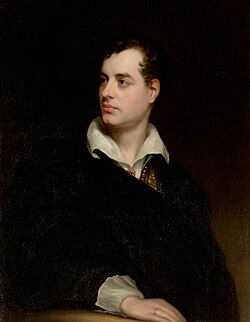Lord Byron Quote
A mighty mass of brick and smoke and shipping Dirty and dusty but as wide as eye Could reach with here and there a sail just skipping In sight then lost amidst the forestry Of masts a wilderness of steeples peeping On tiptoe through their sea-coal canopy A huge dun cupola like a fools-cap crown On a fool's head - and there is London Town.
Lord Byron
A mighty mass of brick and smoke and shipping Dirty and dusty but as wide as eye Could reach with here and there a sail just skipping In sight then lost amidst the forestry Of masts a wilderness of steeples peeping On tiptoe through their sea-coal canopy A huge dun cupola like a fools-cap crown On a fool's head - and there is London Town.
Tags:
london
Related Quotes
Long before it was known to me as a place where my ancestry was even remotely involved, the idea of a state for Jews (or a Jewish state; not quite the same thing, as I failed at first to see) had been...
Christopher Hitchens
Tags:
ancestry, antisemitism, arabs, armageddon, arthur balfour, bedouin, bolshevism, britain, christianity, colonialism
But a progressive policy needs more than just a bigger break with the economic and moral assumptions of the past 30 years. It needs a return to the conviction that economic growth and the affluence it...
Eric Hobsbawm
Tags:
britain, capitalism, economics, education, london, morality, nobel prize, politics, progressivism, universities
About Lord Byron
George Gordon Byron, 6th Baron Byron (22 January 1788 – 19 April 1824), was an English poet. He is one of the major figures of the Romantic movement, and is regarded as being among the greatest British poets. Among his best-known works are the lengthy narratives Don Juan and Childe Harold's Pilgrimage; many of his shorter lyrics in Hebrew Melodies also became popular.
Byron was educated at Trinity College, Cambridge, before he travelled extensively in Europe. He lived for seven years in Italy, in Venice, Ravenna, Pisa and Genoa after he was forced to flee England due to threats of lynching. During his stay in Italy, he would frequently visit his friend and fellow poet Percy Bysshe Shelley. Later in life, Byron joined the Greek War of Independence to fight the Ottoman Empire, for which Greeks revere him as a folk hero. He died leading a campaign in 1824, at the age of 36, from a fever contracted after the first and second sieges of Missolonghi.
His one legitimate child, Ada Lovelace, was a founding figure in the field of computer programming.
Byron was educated at Trinity College, Cambridge, before he travelled extensively in Europe. He lived for seven years in Italy, in Venice, Ravenna, Pisa and Genoa after he was forced to flee England due to threats of lynching. During his stay in Italy, he would frequently visit his friend and fellow poet Percy Bysshe Shelley. Later in life, Byron joined the Greek War of Independence to fight the Ottoman Empire, for which Greeks revere him as a folk hero. He died leading a campaign in 1824, at the age of 36, from a fever contracted after the first and second sieges of Missolonghi.
His one legitimate child, Ada Lovelace, was a founding figure in the field of computer programming.
